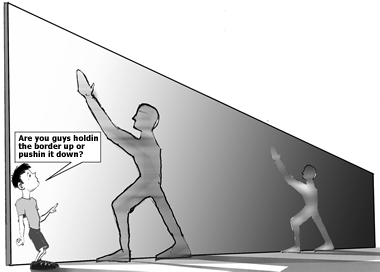
Illustration by Arnie Bermudez
|
|
By Sabrina Noble
Arizona Daily Wildcat
Thursday, September 18, 2003
For the next two months, students will be greeted by "Border Dynamics," a new work of art alongside the Mall. The piece features four 14-feet tall human figures of steel on either side of a replica of the U.S.-Mexico border. It's commissioned by Beyond Borders, a Tucson-based non-profit organization whose mission, in part, is to promote art "to focus international attention on the unique culture created by the · border." Beyond Borders has expressed the hope that the project will show that humanity has no borders, but opinions about exactly what the statues are doing ÷ holding up the border or pushing it down ÷ will vary.
What they should be doing is an entirely different story. Those who guard the U.S. border fight a nightly battle against a tidal wave of human life washing up against, over and through the fences. Some say the U.S.-Mexico border is futile; in 2000, about 2.5 to 3.5 million Mexican immigrants were living here illegally.
Others say the border works all too well. To make it to the U.S., illegal Mexican immigrants must outwit fiber optics, dogs, high-powered cameras, spotlights and helicopters equipped with infrared radar. Some spend the equivalent of $1000 to cross, paying entrepreneurial Mexicans to drive them to the border and cut the iron bars with hacksaws.
And after all that trouble and money, hundreds of would-be immigrants are caught and detained within minutes of entering the country. They are found crossing through the desert by the truckload in the night and languishing under the sun by day. Often they'll be sent straight home.
Many will try again. And again. And again.
 |
|
Sabrina Noble
Contributing Writer
|
|
|
Others will die trying. Since October, 146 Mexicans have died attempting to cross the desert.
Without doubt, this loss of life is tragic. Should we instead help them come into the U.S., the land of opportunity?
No, we should not. While any loss of life is terrible, Mexican immigrants know the risks of trying to enter the U.S. illegally. They are breaking the law by violating our nation's borders and living and working in the country without the government's consent.
Many aid groups would have Americans feel guilty for wanting to enforce the U.S. border against Mexican migration. Of "Border Dynamics," Tom Whittingslow, founder of Beyond Borders, says, "These figures are allegories of how we behave when confronted with barriers ÷ either external or of the mind." Whether the imposing statues are trying to collapse the border or pushing to keep others out is supposedly up to the viewer's prejudices, racial or otherwise.
However, to state that border politics are merely a racial matter is taking the easy way out in this politically correct world. Of the nearly eight million Mexican immigrants in the U.S., two-thirds have never completed high school. Most are unskilled laborers that do little to save consumers money and who actually lower average unskilled wages.
But this isn't simply an argument over the American economy, either. We must also ask if life for immigrants in the U.S. is actually better than what they left behind. Though Mexican immigrants represented only 4.2 percent of the total population in 2000, they represented 10.2 percent of the population in poverty and 12.5 percent of those without health insurance.
More striking than the economic and health figures, though, are Arizonans' own response to the border issue. A series of polls run by the Arizona Daily Star found that 66 percent of voters said legal guest workers should not be allowed in the U.S. ÷ only 17 percent said "yes" in order to prevent desert deaths. A staggering 82 percent of voters in another poll felt leaving water jugs in the desert to help illegal immigrants should be stopped because it only encourages them. After three weeks of voting, 90 percent of 20,000 voters favored forming citizen militias to combat illegal immigration ÷ the highest voter response ever recorded by the Daily Star.
Tom Whittingslow would call this xenophobia. On the contrary, this is simply a desire to make sure our nation's boundaries do what they've been built to do: regulate who comes and goes from the country. In the end, humanity does have borders and the U.S.-Mexico border is among them. International borders serve a valid purpose, and it's not to be humanistic; they must be respected. By sneaking across, illegal immigrants choose to risk their lives and force Border Patrol and citizens to respond. We shouldn't feel guilty or racist for enforcing our boundaries ÷ and while some might choose to lend help, we certainly shouldn't feel obligated to aid criminals.
